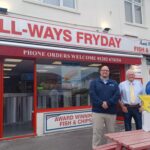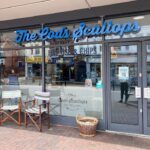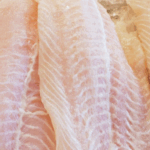Inspired by his grandfather, who opened the first family fish and chip shop 100 years ago, Hugh Lipscombe has gone on to create a multi-million pound business selling 7,000kg of cod and haddock a week, 3,500 chickens, 2,000 bags of potatoes and 20,000 plus sausages. As chairman of The Chesterford Group, we caught up with Hugh to find out how the business has evolved
You are celebrating 100 years since your family opened its first fish and chip shop, so how did it all begin?
It’s a great story. My grandfather Harold was a good cricketer and he was playing for Accrington, a semi-professional club in the Lancashire League. Whenever he got five wickets or 50 runs, my nana would pass a bucket round and the supporters would put money into it to say thanks for the entertainment! In those days they would get 3,000-4000 people watching. She saved all the money up that my grandfather made from playing cricket and when the Depression came in 1923, they came down south and bought a fish and chip shop in Rush Green, Romford, in Essex. Before the Second World War, my dad was in the stock exchange and after chasing Germans around for five years he didn’t fancy going back to the city life and so he bought a fish merchants business in Billingsgate in London. Then in 1954, he bought a fish and chip shop in Harold Hill, which we lived above when I was a little boy. Believe it or not, we still own it today!
Were you expected to follow in their footsteps?
Not really. When I was about 15 or 16, I wanted to own a hotel for some bizarre reason so I did a hotel management course. I eventually realised I’d never get the money – I needed about £55,000 which was a lot of money in those days – but I did manage to scrape together £12,500 to buy a fish and chip shop in Potter Street in Harlow in 1970. However, I was only allowed to borrow the money on the condition I went out and saw a bit of life before I started working. So as a 19-year-old, newly married, I went to Australia with my wife Jackie for a year. We had an amazing experience – I worked on a farm and for Coca-Cola – and then we came back here and started our journey in the industry. We bought another shop in Stevenage the following year, which we ran together, and we gradually expanded from there.
You are now at around 40 takeaways, was it always part of your plan to expand to that size?
No, and it sounds a bit silly but, for me, it’s never really been about money. It’s been about finding a shop and then thinking, I can make this work! Over the years, we’ve hit on a formula that works for us: neighbourhood shopping centres, plenty of car parking, in a parade of 15 or 20 shops surrounded by 12,000 people. I can’t believe we have now got 40 stores, the Pret franchise and 800 people working for us. It’s more than I ever could have dreamed of.
How’s the Pret franchise going?
Really well. Margins were getting tighter on fish and chips and it was becoming difficult for us to buy good shops, so we looked in a different direction and settled on the franchise with Pret as we felt culturally they were the perfect fit for us. We bought four shops from them in our territories of Cambridgeshire, Hertfordshire and Essex, and we have another one opening in Bishop’s Stortford this month, and then another five opening in the next six months. There is no really good quality, fresh, healthy food-to-go on British regional high streets and you really can’t beat the fresh ingredients and organic coffee from Pret. But the most important thing for us, was working with a partner that championed their people as much we do, and with Pret we have found someone who does.
I’m very lucky because my son James, our CEO, is a real entrepreneur. He’s really driven and his ambition is to create a multibranded food business that both our people and customers love.
Can you see yourself expanding beyond the South East?
Never say never! At the moment we are in the London bubble, within 50 miles of London all the way around, because that’s where the disposable income is. If you said to me, would you want to go to Yorkshire, I’d go to Harrogate and other affluent areas but I wouldn’t go to areas that I know struggle to get the price they need for fish and chips to be profitable.
How are your fish and chip shops doing?
It is hard but, luckily, the shops are busy. We’re running above budget and our customer numbers count is in front of pre-pandemic levels, so, on the whole, it’s pretty good. Having said that inflation is rampant. We’ve just heard our chicken nuggets are going up 15% in price and chicken burgers by another 10%, but with what we’ve been through over the last couple of years, I am confident we can succeed in any environment. We are fortunate to have incredible people in our business. Paul, our MD, lives and breathes fish and chips. His passion, hard work and love for the industry is incredible and I couldn’t be prouder of how him, James, and everybody in our business have reacted to everything that’s been thrown at them.
How do you manage price increases like that?
We’ve got three options realistically: look for cheaper products – which is against all of our company ethos – pass some cost on to our customers, or look at ways we can cut costs. It’s a culmination of the last two.
I guess you’ve seen most things during your time in business now?
Yes and no. I mean if you’d said to me five years ago, there’s going to be a war in Europe, we’re going to leave the EU and there will be a worldwide pandemic I would have said don’t be so bloody stupid! But I do remember as a young kid when I was at Stevenage, I’d be frying away quite merrily and suddenly all the power would go off because of the Three-Day Week. I think what I’ve learned is that we’ve always done well in a recession and that’s why we’re doing fairly well now. We’re £10.20 for cod and chips, which I know is a lot, but it’s still a hell of a lot cheaper than going to a restaurant. Realistically, when we first put our prices up, demand dropped, but it’s coming back again as people get used to paying higher prices for everything. And what we have noticed is that we are selling less fish, but more chickens, more saveloys, more ribs – the cheaper items.
When I called initially to do this interview, you were driving a forklift, so you are clearly very hands-on still?
You name it, I’ve done it. I’ve always said, I would never ask anybody to do something I wasn’t prepared to do myself even if it’s clearing out the drain.
One of my jobs is to phone around the shops everyday to get the fish orders, but really it’s an excuse to speak to all the managers. I’ll say, I see United got beaten yesterday, or if they’re into F1 or rugby, I’ll ask them about that, I’ll ask how the kids are, I think that’s important to be in touch with them all.
One of the things that gives me the most satisfaction is that a lot of our staff have been with us for 30 or 40 years. Some have only ever worked for us. Paul Goodgame, his dad was my first operations manager, so Paul’s worked for us all his life. Wayne, our operations manager, he’s worked for us since he left school at 14 or 15. I’m proud of that.
Do you have plans to retire anytime soon?
I’m 71 and I’ve always said when I get out of bed in the morning and think, I don’t want to do this anymore, then I’ll stop. Or if I feel I’m not contributing then I’ll stop and do whatever James or Paul want me to do. But I’m not there yet!
What’s been your inspiration throughout your career?
The main thing that has inspired me is my workforce, seeing how it has grown by giving people opportunities. I firmly believe that if you don’t move forward, you stand still. And if you stand still, people lose inspiration. When I go and see the managers, the fact I can say, we’re buying a shop here, we’ve taken over this business, or they say to me, I’m really interested in Pret, any chance of me going to manage one, it inspires them to do the best that they can at work.
What are your predictions for the industry?
Three or four years ago, a husband and wife team running a £4,500-a-week shop, staying in the flat upstairs could make a living, but now, I don’t think they can. What we’re going to see is a lot of small shops shutting – which maybe isn’t a bad thing – and the more professional businesses will thrive. Having said that, the industry has got lots of challenges ahead: the fact that 40% of the cod and haddock used in the UK comes from Russia, which of course, is not happening at the moment. We’ve got potatoes possibly going up because of the cost of electricity when they are in storage. It’s certainly interesting times.
If you could change one thing about the industry, what would it be?
I’d love to see the elimination of illegal operators as they are so damaging to the industry and the loss to the economy is huge. We have had to walk away from a number of purchases recently because when we did our due diligence, the individuals were running illegal businesses. It’s a huge issue to tackle but I think if the suppliers didn’t accept cash on wholesale purchases, that would be a starting point to phasing them out, which would be better for us all.










